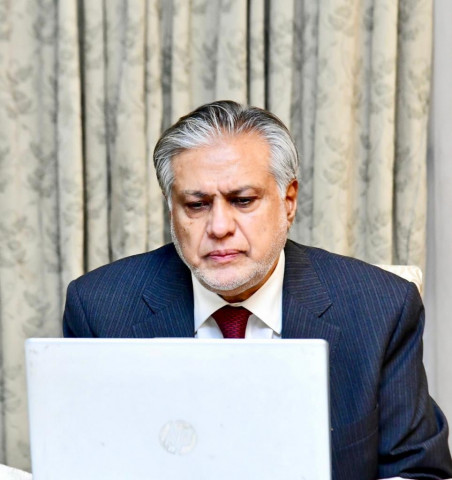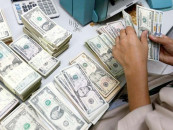Dar steers away from cutting taxes, providing subsidies
Says rupee devaluation generated Rs1.5tr bonanza for exporters

The government has estimated that exporters earned a bonanza of Rs1.5 trillion over the past three years due to steep currency devaluation. This gain far exceeded the increase in electricity prices and eliminated the need for electricity subsidies to exporters.
The estimates were prepared ahead of the first face-to-face meeting between Finance Minister Ishaq Dar and representatives from the exporters and the Federation of Pakistan Chambers of Commerce and Industry (FPCCI), said the sources.
During the meeting held on Friday, Dar promised a business-friendly budget but did not commit to reducing taxes or providing subsidies for electricity and gas, according to participants.
A finance ministry statement mentioned that Dar met with a delegation from the All Pakistan Textile Mills Association (APTMA) that apprised the finance minister about issues related to the textile industry, including supply chain challenges, regulatory issues regarding imports and exports, energy-related concerns, and supply for various plants in Punjab.
The delegation also highlighted disparities among provinces regarding energy prices and supply, seeking the minister’s support in resolving these issues.
As per the conditions agreed with the International Monetary Fund (IMF), the government withdrew the Rs7.5 per unit electricity subsidy that exporters had been availing since February this year.
Over the past four years, the federal government provided Rs181 billion in electricity subsidies to exporters, but the actual benefits were lower than these subsidies, according to finance ministry officials.
The devaluation of the Pakistani rupee has given a significant advantage to export industries. The finance ministry estimates that export-oriented units have gained over Rs1.5 trillion due to exchange rate devaluation since 2020. This gain surpasses the increase in electricity rates, according to the finance ministry officials.
Since July 2018, the Pakistani rupee has lost 133% of its value, benefiting exporters. However, some of these gains have been offset by the increased cost of doing business.
Khurram Mukhtar, a leading exporter from Faisalabad, stated that no major decisions were made during the meeting with the finance minister. Exporters have demanded that the government establish a cost-based industrial tariff, which will not involve any subsidy.
While many categories of consumers, including domestic users, pay more than the cost of electricity, particularly time-of-use meter consumers paying Rs35 per unit, the exporters argue for fair treatment.
The official statement emphasised that Dar is committed to providing maximum facilitation by the government to the textile sector to strengthen exports and promote Pakistan’s export-led growth. The finance minister also directed the relevant authorities to prioritise addressing these issues.
Under the previous political regime, electricity subsidies continued, but they did not lead to a significant increase in exports, except during periods of high global commodity prices. The volume of exports did not see significant growth. In the first ten months of the current fiscal year, exports declined by double digits despite exporters availing subsidies until February this year.
In 2019, the per-unit subsidy was Rs5.5, which the Pakistan Tehreek-e-Insaf (PTI) government increased to Rs6.5 per unit. The Pakistan Democratic Movement (PDM) government further raised the subsidy to Rs7.5 per unit before withdrawing it under the IMF program.
A delegation from FPCCI also met with the finance minister requesting a reduction in tax rates in the upcoming budget. The FPCCI urged the government to reduce withholding taxes on imports across all categories. They also sought a reduction in the turnover tax rate to 1% and a lower corporate income tax rate of 27%.
The finance minister assured the business community that no new taxes would be imposed in the budget, and existing taxpayers would not face additional burden, according to Irfan Iqbal Sheikh, President of the FPCCI.
Sheikh mentioned that the finance minister categorically stated that the withholding tax on cash withdrawals would not be reinstated.
A finance ministry statement noted that the FPCCI delegation presented proposals for the upcoming federal budget, offering full support to the government’s efforts to revitalise the economy and enhance exports.
The finance minister assured the delegation that the government is fully aware of the difficulties faced by the business community and will incorporate the Chamber’s suggestions in the upcoming budget, as stated by the finance ministry.
Published in The Express Tribune, May 19th, 2023.
Like Business on Facebook, follow @TribuneBiz on Twitter to stay informed and join in the conversation.


















COMMENTS
Comments are moderated and generally will be posted if they are on-topic and not abusive.
For more information, please see our Comments FAQ